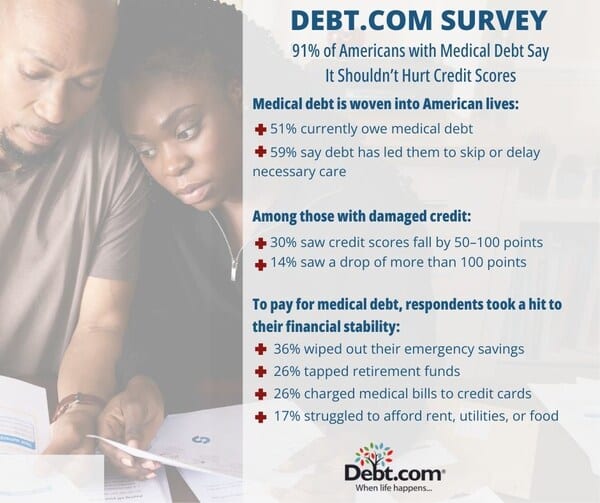Debt.com Study: 91% of Americans with Medical Debt Believe It Shouldn't Affect Credit Ratings – But Legislative Threats to CFPB Could Jeopardize Protections
FORT LAUDERDALE, FL – May 02, 2025 /Noticias Newswire/ – A recent nationwide survey by Debt.com reveals that nearly 90% of Americans carrying medical debt think it should not impact their credit scores. This comes shortly after the Consumer Financial Protection Bureau (CFPB) enacted a rule aimed at excluding medical debt from credit reports. Despite this progress, the future of this regulation is at risk, as some lawmakers are calling for its dismantling.
The survey, which included 682 U.S. adults, found that the majority of participants support the CFPB's decision. Specifically, 91% of those with medical debt believe it should be excluded from credit reports. Over half of those surveyed reported that their credit scores have already been negatively affected by medical bills, with some individuals seeing their scores drop by over 100 points.
The survey paints a troubling picture of how deeply medical debt is woven into American lives:
- 51% currently owe medical debt
- 59% say their debt has led them to skip or delay necessary care
- 20% owe $10,000 or more
- 9% owe $50,000 or more
Among those with damaged credit:
- 30% saw their credit score fall by 50–100 points
- 14% saw a drop of more than 100 points
[caption id="attachment_56845" align="aligncenter" width="600"] A new national survey from Debt.com finds 9 in 10 Americans with medical debt believe it should not appear on credit reports, just months after the Consumer Financial Protection Bureau (CFPB) finalized a rule to remove it. According to the poll of 682 U.S. adults, the vast majority support the CFPB’s move, with 91% of those with medical debt agreeing that it should be excluded from credit reports.[/caption]
A new national survey from Debt.com finds 9 in 10 Americans with medical debt believe it should not appear on credit reports, just months after the Consumer Financial Protection Bureau (CFPB) finalized a rule to remove it. According to the poll of 682 U.S. adults, the vast majority support the CFPB’s move, with 91% of those with medical debt agreeing that it should be excluded from credit reports.[/caption]
To pay for medical debt, survey respondents took a hit to their financial stability:
- 36% wiped out their emergency savings
- 26% tapped retirement funds
- 26% charged medical bills to credit cards
- 17% struggled to afford rent, utilities, or food
As inflation continues, 86% say it's become harder to pay off medical debt. The consequences are not only financial but deeply personal with 57% saying debt is delaying major life goals like higher education, marriage, homeownership, or starting a family. Millennials are the most affected, with 62% reporting that medical debt is holding them back. Debt.com's data suggests Americans overwhelmingly oppose the idea of the CFPB medical debt protections ending—and want solutions that reflect financial reality, not punishment for medical emergencies.




